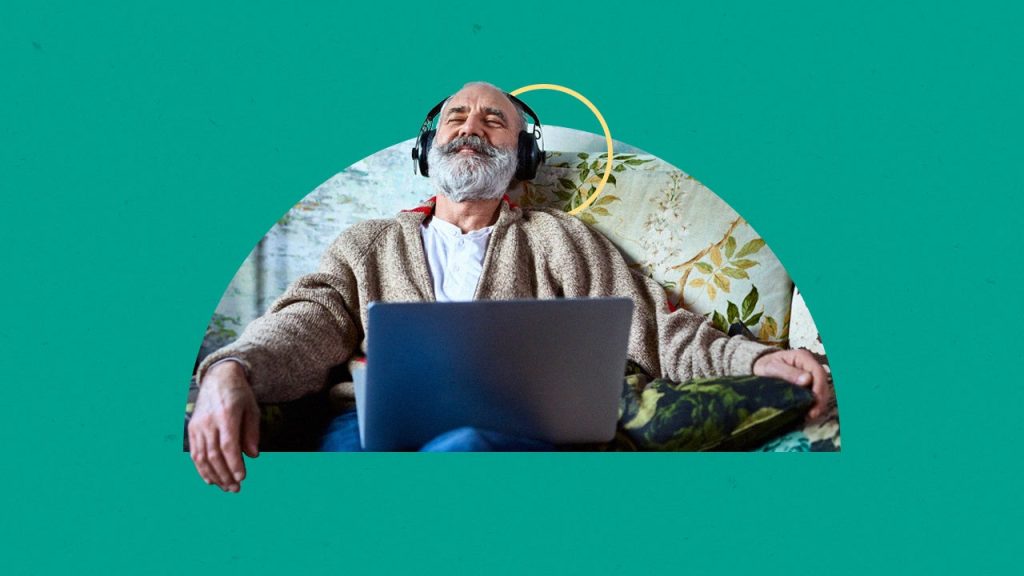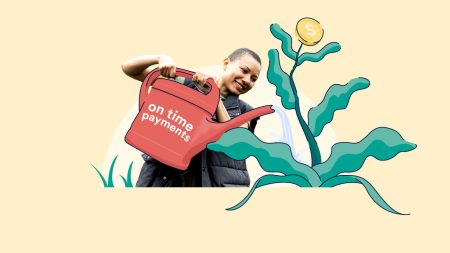Key takeaways
- High debt levels can lead to increased stress and anxiety, pessimism about the future and a diminished social life.
- Creating a plan to pay down debt can improve your emotional outlook. It gives you a sense of control, shifts you from panic to action and helps reduce harassing creditor calls.
- Once debt is paid off, maintain your emotional well-being by following a budget and paying bills on time and in full each month.
Americans across the nation feel the impact of rising prices and increasing financial strain. Bankrate’s Credit Card Debt Survey found roughly one-third of U.S. adults (34 percent) have at least one credit card that carries a balance month-to-month. But the burden of debt extends beyond the numbers. Debt carries a psychological weight that affects mental, emotional and even physical health. The pressure to repay debt can lead to chronic stress, strained relationships and harmful coping behaviors.
Making a plan to pay what you owe — whether that be through debt consolidation or another repayment strategy — can improve your well-being and help reduce your mental and emotional stress.
Bankrate Data Center
Since 1976, Bankrate has been the go-to source for personal finance data, publishing average rates on the most popular financial products and tracking the experience of consumers nationwide.
Learn more
The psychological effects of being debt free
According to experts, paying off debt comes with perks beyond making space in your budget.
Less stress, more focus
It’s no surprise that debt causes stress — but few realize just how deeply it affects mental health.
In Bankrate’s latest Money and Mental Health Survey, 42 percent of U.S. adults reported that money negatively impacts their mental health. Among those aged 35 to 54, that number jumps to 52 percent.
Dr. Mark Aoyagi, a professor at the University of Denver’s Graduate School of Professional Psychology, explains that while short-term stress can sharpen our focus, chronic stress does the opposite — it drains mental energy and narrows our ability to think clearly.
When we’re threatened — and debt could be perceived as a threat — our vision literally narrows.
— Dr. Mark Ayogi
University of Denver
Debt-related stress often creates a “constant pull on our attention,” making it difficult to focus on other aspects of life, such as work, relationships or personal goals. Becoming debt-free can lift that psychological burden, freeing up cognitive space and emotional energy.
Relief as a powerful motivator
Relief is more than a feeling. Dr. Pearl Chiu, a psychology professor at Virginia Tech, notes that while we often think of reward or loss as behavioral drivers, relief can shape our decisions in profound ways.
“Being debt-free is really relieving in some ways and can have positive impacts on behavior,” she says.
Feeling relief not only signals emotional safety but also encourages more confident, future-oriented choices. By eliminating the immediate threat of debt, individuals can shift from survival mode to strategic planning — researching for the best loan rates, setting savings goals and making empowered financial decisions.
Improved relationships
Debt doesn’t just affect your internal world — it can impact your relationships as well. According to Bankrate’s 2025 Financial Infidelity Survey, 40 percent of Americans in a committed relationship have kept a money-related secret from their partner. Nearly a third (33 percent) reported spending more than their partner would like, and 23 percent secretly racked up debt.
Financial strain is a common source of tension in relationships, often leading to conflict, secrecy and emotional distance. Paying off debt together — or individually — can reduce that strain and foster healthier communication.
Psychological challenges of paying off debt
Becoming debt-free has significant mental health benefits, but the path isn’t always easy. Many individuals face internal barriers that make debt repayment psychologically difficult.
Shame
Shame is one of the most overlooked obstacles to financial recovery. People in debt often feel embarrassed, believing their situation reflects personal failure.
According to Aoyagi, this is basic biology. In their evolutionary past, humans became apex predators not with claws and teeth but by cooperating, which made maintaining their status in the “tribe” vital.
“How others perceive us and how we see ourselves in the tribe, is our biggest strength,” he says. “People who have a lot of financial stress — they’re seen less favorably.”
Fear of being seen as a social failure “prevents us from using our most effective resource” — other people, Aoyagi says. Overcoming shame by seeking support — whether from credit counselors or financial advisors — can be a major psychological breakthrough.
Scarcity mindset and risky behavior
Debt can also trap individuals in a “scarcity mindset.” Dr. Elliot Berkman, a psychology professor at the University of Oregon, explains that financial stress can impair long-term thinking.
“When you’re low on resources, it’s the same as being cognitively distracted,” says Berkman. “Scarcity makes it hard for us to focus and engage in high-level thinking.” In this state, individuals often take riskier financial actions — not because they’re reckless, but because they’re desperate to escape the pressure.
Paying off debt can break this cycle, helping people shift from reactive decisions to strategic, long-term planning. With greater mental clarity, people can focus on building financial stability.
Strategies for paying down debt
To unlock the psychological benefits of becoming debt-free, it’s essential to create a plan that feels manageable and empowering. Here are some debt payoff strategies that can also support your mental well-being:
- Debt management plan (DMP): Through a DMP, you work with a credit counseling agency to consolidate debts into an affordable monthly payment. Your creditors may agree to waive fees or reduce your interest rates.
- Credit counseling: Credit counseling involves working with a reputable agency that examines your finances and helps you develop a budget and debt payoff strategy, such as a DMP.
- Negotiating with creditors: You could contact creditors and discuss credit card hardship programs or more favorable repayment terms (such as reduced interest rates or lump-sum payments). Or, you might work with one of the best debt relief companies.
For a more in-depth guide to approaching your debt, check out Bankrate’s expert advice on getting out of debt.
How to avoid future debt
That final debt payment is a great reason to celebrate. But the celebration shouldn’t involve taking on more debt or spending more money. Resist the temptation to get that extra credit card unless it’s part of a carefully considered plan to rebuild your credit score — secured credit cards can be valuable credit-building tools.
Instead, put your newfound motivation into sticking to a budget and keeping track of your bills. Money you free up when your monthly debt payments end can go into an emergency fund to prevent debt from unexpected expenses. If you already have a healthy emergency fund, consider investing in a high-yield savings account or retirement account so your money can grow.
Other ways to avoid getting back into high levels of debt include:
- Borrowing only what you need
- Being cautious with Buy Now, Pay Later (BNPL) programs
- Paying credit card bills in full each month
Bottom line
Paying off debt isn’t just a financial achievement — it’s a psychological liberation. From reduced stress and improved focus to better relationships and clearer thinking, becoming debt-free transforms more than just your bank account. By making a plan and taking consistent action, you can shift from survival mode to thriving.
Read the full article here









